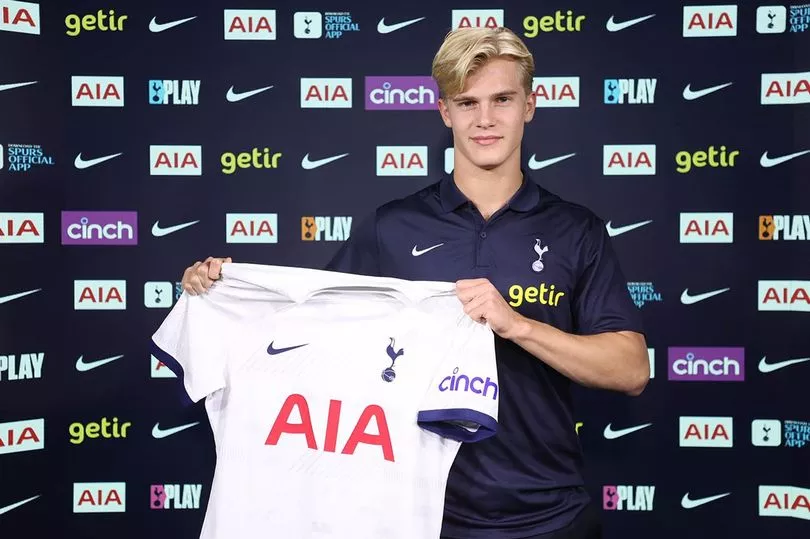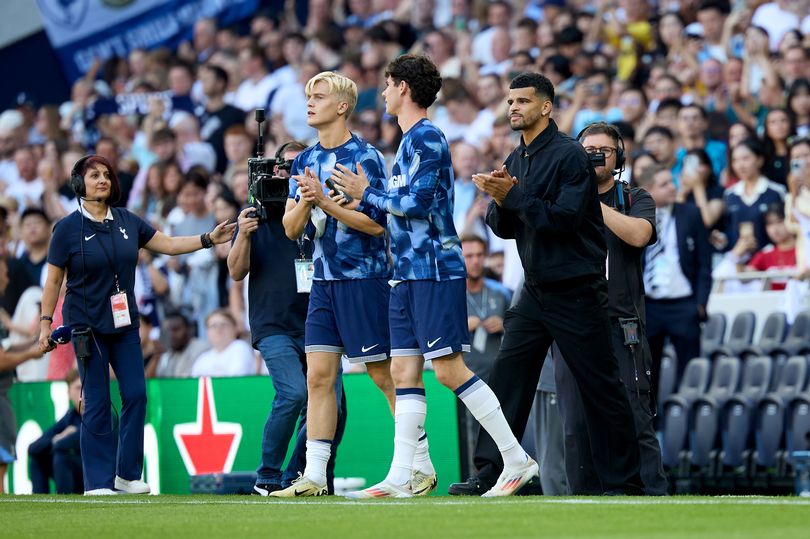The future arrived prematurely for Tottenham Hotspur at Anfield, as Ange Postecoglou’s bold decision to start teenage midfield duo Lucas Bergvall and Archie Gray backfired spectacularly against newly crowned champions Liverpool.
What was meant to be a glimpse of Tottenham’s promising tomorrow became a harsh lesson in the challenges of blooding young talent against Europe’s elite, with the 5-1 demolition exposing the gulf between potential and Premier League-ready quality.
Postecoglou’s team selection – clearly prioritizing Thursday’s Europa League semi-final against Bodo/Glimt – handed the 18-year-old Bergvall and 19-year-old Gray a baptism of fire alongside James Maddison in midfield.
The Australian’s pre-match enthusiasm about this being “a glimpse of our future” quickly evaporated as Liverpool’s experienced trio of Alexis Mac Allister, Dominik Szoboszlai, and Ryan Gravenberch schooled their youthful counterparts in the brutal realities of top-flight football.
The match unfolded as a microcosm of Tottenham’s broader strategic dilemma. Gray, a £40 million summer signing from Leeds, found himself repeatedly outmuscled and outthought – most notably when Gravenberch shrugged him off effortlessly in the buildup to Mac Allister’s thunderous strike.

Bergvall’s afternoon hit its nadir when his weak defensive header from a corner fell perfectly for Cody Gakpo to hammer home Liverpool’s third, prompting scathing criticism from Sky Sports’ Gary Neville who branded the effort “pathetic.”
Postecoglou’s post-match assessment carried the weary tone of a manager caught between competing priorities. “We knew the challenge today would be monumental,” he admitted. “Starting two teenagers in midfield against the champions, changing three of our back four – logically this was always going to be a punishing experience.”
His words hinted at the fundamental tension between Tottenham’s long-term vision and the immediate demands of competing at England’s highest level.
The match laid bare the risks of Tottenham’s transfer strategy under chairman Daniel Levy. While rivals like Liverpool and Arsenal blend promising youngsters with prime-age stars, Spurs have increasingly gambled on teenage prospects – Bergvall (18), Gray (19), Wilson Odobert (19), and Luka Vuskovic (17) among them.
This policy, while fiscally prudent and potentially rewarding in future seasons, creates inevitable growing pains that were brutally exposed at Anfield.
Gray’s predicament encapsulates Tottenham’s developmental challenge. The versatile Englishman, who impressed as a midfielder for Leeds last season, has spent much of this campaign filling defensive gaps across Tottenham’s backline.
Thrust into his natural midfield role against Liverpool’s press, he appeared tactically uncertain and physically overmatched – understandable for a teenager making just his fourth Premier League start in central midfield.
Bergvall’s struggles carried different nuances. The Swedish prodigy, signed from Djurgårdens in January, boasts technical qualities that align perfectly with Postecoglou’s system but lacks the defensive awareness and physicality required against elite opposition.
His 58 touches yielded little meaningful impact, while his set-piece defending proved costly – issues that typically iron out with experience but currently leave Tottenham vulnerable in crucial moments.
The broader concern lies in Tottenham’s squad construction. While Postecoglou publicly endorses the youth-focused strategy, his recent comments about “getting it wrong earlier this season” suggest private frustrations about the lack of ready-made quality.
The £108.5 million invested in Bergvall, Gray, and Odobert represents potential rather than immediate returns – a luxury Tottenham can ill afford if they hope to bridge the gap to the Premier League’s upper echelon.
Sunday’s humiliation raises uncomfortable questions about Tottenham’s roadmap. While their Europa League campaign offers a more forgiving environment for blooding youngsters, Premier League matches – particularly against title contenders – demand proven quality.
The danger is that repeated exposures like Anfield could damage confidence and stunt development, creating a vicious cycle where potential never translates into consistent performance.

